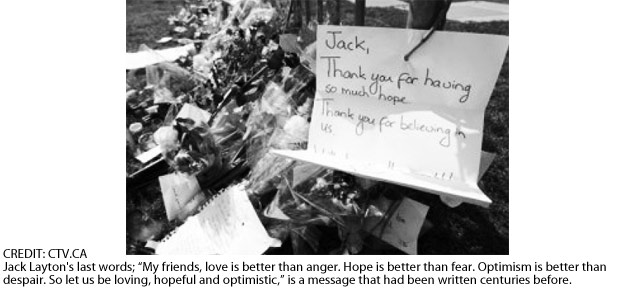Notes from Day Seven: Jack Layton revisited - The greatest is love

By the time you read this, Jack Layton's funeral will have taken place some time ago. But, hopefully, some of what he valued will not be forgotten.
Most Canadians did not vote for Layton and the NDP during the recent federal election. Many who would otherwise not want to speak publicly in favour of him or the party, however, had nothing but words of praise when the country learned of his death. Former Conservative Prime Minister Brian Mulroney said, "He was trustworthy like his dad ... " Interim Liberal leader Bob Rae said, "Mr. Layton showed tremendous class and quality with his determination to go ahead despite the news." Prime Minister Stephen Harper, never a fan of the NDP, not only praised Layton, but provided a state funeral for him, an honour never before given to a parliamentary opposition leader, never mind one who had been in that role for only a few months.
Should all this praise coming from former enemies and recent political rivals be labelled hypocrisy? Perhaps for a few that's what it is. There may be leaders who don't mind taking advantage of an opportunity to praise someone only because everyone else is doing the same, and to not join might hurt the chances of future political success. In that case, we could still take some small comfort in what someone once cynically said: "Hypocrisy is the compliment vice pays to virtue."
However, I think, most did not knowingly seek to be hypocrites when they spoke of Jack Layton. Rather, Canadians everywhere seemed to sense that Layton's death was an opportunity to tap into something deeper — and something that increasingly seems necessary for a civil society: Love.
Layton addressed his parting letter not only to his party but to all Canadians. And it ends with a call to love.
The letter is not free of Layton's loyalty to the NDP, but through it flow deeper currents. Some of them are obvious, for example, the value placed on young people, on the fight against climate change and on the shaping of an economy that is fair for all, especially the less fortunate. Also inherent in the letter is a valuing of intellectual life: the letter is thoughtful and reasoned, a breath of fresh air to any who feel overwhelmed by superficial commentary and simplistic slogans. The letter celebrates the pursuit of positive change. The letter is respectful of its readers, assuming that we have it in us to build a country that all can call home.
And at its end, the letter contains a call to illuminate our world with, first of all, love. "My friends, love is better than anger. Hope is better than fear. Optimism is better than despair. So let us be loving, hopeful and optimistic."
To many, the call to love, hope and optimism may have a familiar ring. Haven't we heard something like that elsewhere? In the end, Layton's closing words echo those of the Apostle Paul, St. Paul of the Christian tradition. At one point Paul wrote about the gifts of the Spirit of God. "And now, these three remain, faith, hope and love; but the greatest of these is love." Layton, calling Canadians to love. Not a bad final word.
Editorial opinions or comments expressed in this online edition of Interrobang newspaper reflect the views of the writer and are not those of the Interrobang or the Fanshawe Student Union. The Interrobang is published weekly by the Fanshawe Student Union at 1001 Fanshawe College Blvd., P.O. Box 7005, London, Ontario, N5Y 5R6 and distributed through the Fanshawe College community. Letters to the editor are welcome. All letters are subject to editing and should be emailed. All letters must be accompanied by contact information. Letters can also be submitted online by clicking here.













